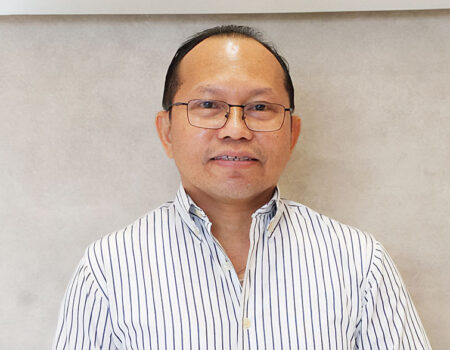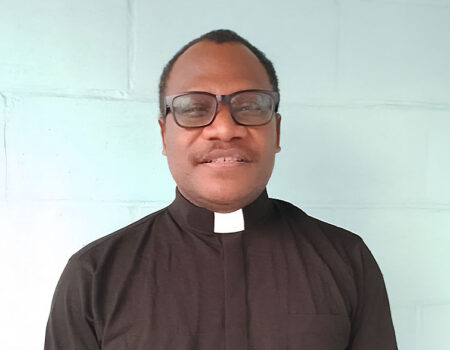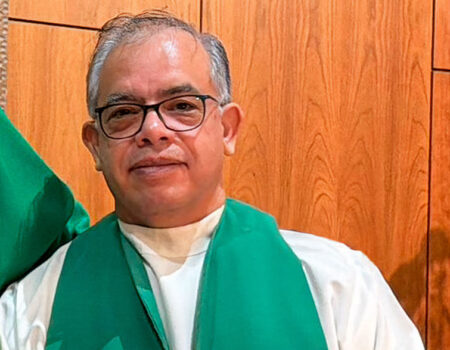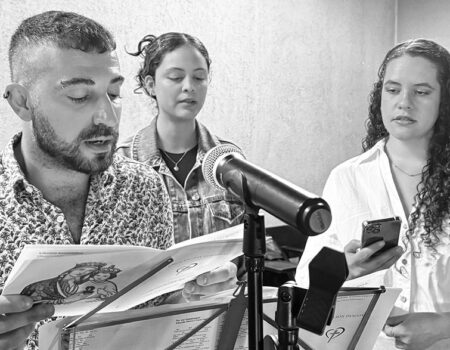Love everywhere the Sacred Heart of Jesus
Monday July 22, 2024
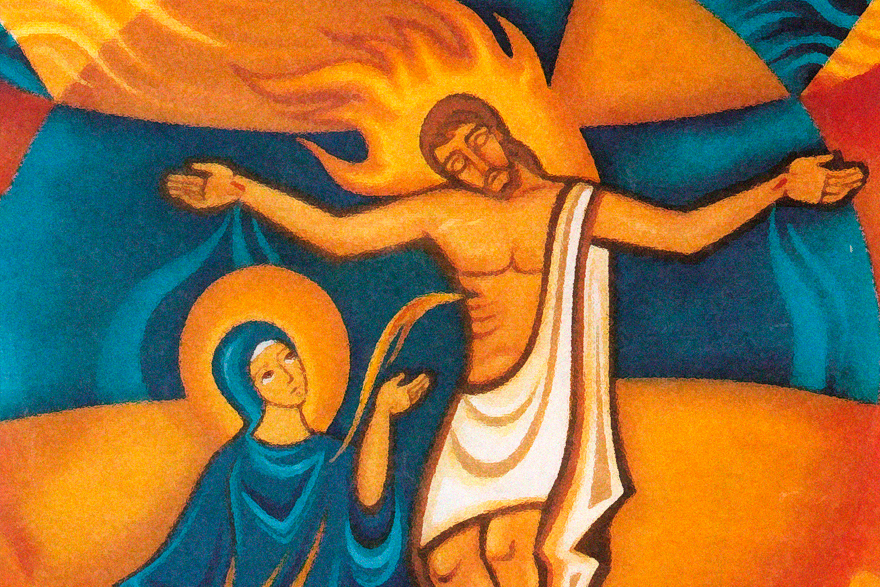
Let’s discover some aspects of Fr Chevalier’s spirituality.
Introduction. Thanks to the historical overview that Fr Auguié has just given us, we have seen how Fr Chevalier allowed himself to be guided by the Holy Spirit throughout his life. Now, let’s discover some aspects of his spirituality. I have deliberately chosen to quote Fr. Chevalier extensively so that you can discover his writings and their spiritual depth.
1. God speaks through creation. While meditating on the book of Wisdom 11:24, Father Chevalier had this intuition: “God hates nothing that he has made; on the contrary, it is out of love that he has created everything”. SCJ 302 “every creature is a word from God.” SCJ 329 “man is created. Now, at this very moment, as I read these words, God is creating me, God is making me from nothing…”. Fr Chevalier asks the question: “What is the reason for my creation?” I suggest that we discover his answer by reading this text together:
“I have loved you with an everlasting love,” God tells me!
I am the one in particular
that God loved so…
I am ungrateful… I am a sinner…
God, greatness par excellence,
God, supreme beauty, boundless perfection,
God loved me
God!… me! What a distance!
The infinite!… the nothing… the revolting nothing!…
And this nothingness God loved. Loved!
O God of love!
Make me understand this word:
Loved and of an eternal love!
Before the beginning
of the first being who began…
Before… and an eternity before…
God loved me…
He alone was, and already he loved me;
He has loved me ever since he was,
that is, since always;
He who has always been
has never been without loving me,
And from all eternity, out of love,
he decreed my creation.” R 17
In this universe created by love, Father Chevalier sees the human being as the link between all creatures and between creatures and God. Man is the masterpiece of creation. Where does this dignity of the human being come from? Fr. Chevalier’s answer is crystal clear: “In making the heart of the first man, his gaze was obviously fixed on that of his Son, whom the Holy Spirit was later to form from the blood of a virgin! SCJ 139 The horizon of creation is the Incarnation of the Son of God and the revelation of the children of God.
2. God speaks of himself in Jesus, the Incarnate Word. I quote Fr. Chevalier: “What do we see in Jesus? A God who becomes man and a man who becomes God. What a distance we have crossed! [Here, divine power goes beyond the limits of our understanding; it goes to extremes; it touches the limits of the impossible itself; and the most irreconcilable terms are reconciled in Jesus. Thus, God cannot be created, the creature cannot be God and yet Jesus is God and man at the same time… so that we can say in all truth: God was born, God suffered, God died.” SCJ 70. “In Jesus, God communicates himself and unites himself infinitely. His love, infinite as it is, can do nothing more…”. SCJ 72.
…Jesus, true God and true man calls disciples. Father Chevalier continues his reflection: “What does the divine Saviour want by coming among us? To take a new birth in our hearts, that is to say, to make us live his life, to communicate his spirit to us, to give us his Heart with all the treasures it contains and to make us experience all the feelings that animate him! M I 25 God becomes a prayer: “My son, give me your heart; give, love is free; I don’t want to steal your heart in spite of you; but give it to me; and for me that is enough: possessing your heart, I will possess all of you, and, through you, all the rest. [My son, give me your heart! SCJ 65-66
Fr. Chevalier likes to meditate on the call of the disciples in Saint John. You will remember the question put to Jesus by the two disciples of John the Baptist: ‘Rabbi, where are you staying? Jesus said to them: ‘Come and see. So they came and saw where he was staying, and they stayed with him that day.” Fr. Chevalier comments, “Come and see” is the word of Philip to Nathanael, of the Samaritan woman to her compatriots.” Father Chevalier even quotes Revelation, chapter 6: “When the Lamb breaks the seals of the book, mysterious animals cry out: ‘Come and see’. This is a law of every created nature.” SCJ 325
3. God speaks in the suffering. “How can we fail to see the suffering? God speaks in the suffering. This spiritual intuition of Fr Chevalier’s certainly has its origins in the blessing he received at the foot of his parish priest’s bed in Aubigny-sur-Nère, as we heard earlier. Fr. Chevalier invites us to contemplate Jesus acting in the Gospels so that we can put his feelings into action within us, in a word, so that our actions resemble those of Jesus. I invite you to read with me:
Jesus’ role on earth
“was not to condemn
but to forgive ;
not to drive away those who suffer
but to relieve them; not to drive away sinners, but to enlighten and convert them;
nor to put off the sick, but to heal them;
not to abandon the lost sheep,
but to bring them back into the fold;
not to extinguish the wick that still smokes,
but to rekindle it;
not to break the fragile reed
but to straighten it.
This is the Sacred Heart! What goodness!
What mercy!” M II 642
Father Chevalier insisted “on our duty towards the poor. [Not only do they lack sacred teaching, but they are also deprived of spiritual and temporal help. Who takes care of them? Yet they are the chosen portion of the divine Shepherd’s flock; they are the privileged friends of his Heart. Could we remain insensitive to their double indigence? If our faith were stronger, we would see in the poor the living image of Jesus Christ, and we would do more to help them”. M I 70-71
Fr. Chevalier states: “If God has given us riches, it is to provide for our needs…, but let us beware of forgetting that our superfluous belong to the poor.” M II 157
4. God speaks in the Eucharist. Father Chevalier reflects as a theologian, starting from the Incarnation and arriving at the Eucharist: “God, all love, feels a supreme need, he is hungry, thirsty to give himself. An infinite fullness, a shoreless, bottomless ocean, he wants to overflow and pour himself out. He overflowed into the world through his Word who became flesh…”. SCJ 277 “The Eucharist is the prolongation and multiplication of the presence of God made man…, the extension of the incarnation of the Word in each of the members of his mystical body… the honour of the Church of which it is the profound symbol and the active focus of its unity.” SCJ 214
Father Chevalier develops his thought by meditating: “it is in the Eucharist especially that he unites himself to us in the most intimate way, and so closely that it is no longer we who live, but he who lives in us.” M II 17-18 In the Eucharist “he is there in his entirety, living for us and calling us to converse heart to heart with us. He is there […] to give himself to us, to nourish us with his body and blood and to transform us into himself. Can we imagine a more intimate and ineffable union […] we become partakers of the divine nature. O Jesus, how good you are! M II 19
When Father Chevalier preaches a retreat in the spirit of Saint Ignatius, the commentary on the last day is devoted to the Eucharist:
The Eucharist: “That is the last word of his infinite tenderness!
To give himself entirely and without reserve…
To incorporate himself into us in the most intimate union…
O mystery of mysteries! […]
He who comes to you, O my soul,
and whom you are about to receive
is your Saviour and your God!
Your friend,… your brother,… your spouse,…
your protector and your father…
Where is the Son who comes to feed you?
there is the Father who comes to adopt you,
the Holy Spirit to sanctify you…
So I will have full confidence…
my Saviour and my God
gives himself to me with all his treasures…
Draw, O my soul, draw with joy
from the pure waters of this fountain
that floods you and gushes up to heaven…
Sing his praises, invoke his name,
publish the wonderful inventions
of his love…” R 93-95
But such a gift, which makes us sharers in God’s life, presupposes that we accept it. Fr. Chevalier has this to say to us: “Just as the Father, in giving us his Son, gave us everything with him, so the Son, in giving himself to us, shares with us all his gifts. What fruit have we gained from so many communions? One would have been enough to make us saints; is that so? M II 36
5. God speaks in the Church. This quotation from Fr. Chevalier is one of the best known: “From this adorable Heart, torn by the lance and from which life had escaped, another life appears to us! … The Word, coming forth from the Heart of his Father, brings the world out of nothing, and from the Heart of the Incarnate Word, pierced on Calvary, I see a new world coming forth, the world of the elect. And this creation, full of greatness and fruitfulness, inspired by love and mercy, is the Church, the mystical body of Christ, which will perpetuate it on earth until the end of time, and will live by his divine life throughout eternity”. SCJ 145-146
So, who is part of this new world, the world of the elect? Father Chevalier quotes nineteenth-century theology: “I know this: there is no salvation outside the Church”, and then he refers to Pope Pius IX: “It is certain that the Church is the only ark of salvation; but it must also be held to be certain that non-culpable ignorance of the true religion does not constitute the least fault before God… God forbid that we should dare to place limits on God’s mercy, which is infinite”. God forbid that we should dare to set limits to the infinite mercy of God. SCJ 299
Fr. Chevalier gives his personal reflection: “This infinite and omnipotent tenderness [of God] would only lead to the loss of the majority of those it wanted to save! In this implacable duel between love and hate, life and death, the final and eternal victory would go to death, to hate! No, no; God did not die on a cross to glean the few chosen here and there! His is the rich and superabundant harvest; His is the final triumph: the Heart of Jesus, to whom we owe heaven, being mercy incarnate, fills our souls with the sweetest hope”. SCJ 300
Fr. Chevalier asked himself: “And Mary, what is she in this spiritual creation that springs from the Heart of her Son at the foot of the Cross? He replied: “She is the marvellous star that reflects the light of this divine sun, and concentrates its life-giving rays to pour them out on her children.” SCJ 146 In his book on NDSC, Father Chevalier comments on “the mystery of the visitation” by saying: Mary “understands the desires of the adorable Heart of the Incarnate Word. She will be the first Apostle of his grace and the first Missionary of his love”. NDSC 108 He goes on to say: “To Jesus alone belongs the glory of being our only mediator. To him alone the absolute omnipotence of a God and to you, O Mary, the omnipotent intercession of a beloved Mother”. NDSC 171
Fr. Chevalier, like the Chevalier family today, prays NDSC every day. I invite you to pray with us:
Remember Our Lady of the Sacred Heart
Of the wonders the Lord did for you.
He chose you for his mother
and wanted you by his cross;
he makes you share his glory,
he listens to your prayer.
Offer him our praise
and our thanksgiving;
offer him our petitions…
Make us live like you
in the love of your Son
so that his kingdom may come.
Lead all people
to the spring of living water that gushes from his Heart,
spreading hope and salvation, justice and peace throughout the world.
See our trust,
answer our call,
and always show yourself our mother! Amen.
6. God speaks in the joy of mission. The mission of Christians is to take up Jesus’ “Come and see” in a personal way. Father Chevalier writes: “What joy there is in the apostolate! And the apostle, whatever his name and whatever means he employs, what does he do but show God? The preacher in the pulpit, the Catholic writer at his desk, the Christian teacher in the classroom, the sister at the bedside, they all show God. They have glimpsed him in the half-light of faith, nurtured by meditation, and delighted by this colloquy, they would like to shout out to everyone: “Come and see! And what a joy it is when they are heard and understood! when souls open up, listen and look, and, overcome in their turn, cry out: “We no longer believe on your word; we ourselves have heard, and we know that this really is the Saviour of the world. No, on earth there is no comparable joy.” SCJ 325
Fr Chevalier reminds us that the Good Shepherd involves us in his mission:
“The Good Shepherd involves us in his mission.
I have other sheep, he says
who are not yet in the fold…
These scattered sheep are all the men
for whom he died
and whom he wants to bring back to his love.
He enjoins us to work,
to serve as his instruments.
What an honour he deigns to do us
by associating us with his mission! MI 522
Conclusion. Fr Chevalier heard Jesus’ “Come and see” which led him to become first a diocesan priest and then a missionary. His discovery of the Sacred Heart profoundly transformed him: he became more and more “immersed” in the pierced Heart of Christ. From this pierced heart, he saw a new world emerge, a world born of the Spirit. This spiritual vision will never leave him, and this new world will blossom in eternity. Father Chevalier is convinced of this, as he writes.
“Hence the title of Bien-dits, which we will receive when we enter heaven. Come, the Blessed, that is to say, the Well-told. Man’s life is a song for two. In us and through us, from now on, God is saying himself, God is singing himself out of himself, and he wants us to say it, to sing it with him. That’s why he makes us intelligent, loving and free. How beautiful is human life understood in this way! SCJ 326.
Sr. Raymonde Gasser Daughter of N.D. du S.C.


